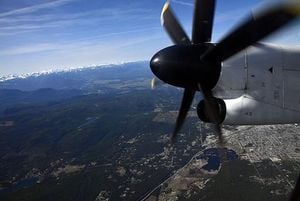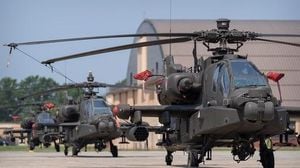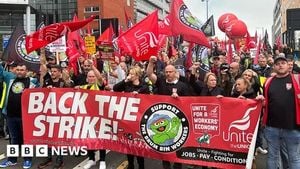Chicago has once again found itself at the center of a national debate over immigration enforcement, as President Donald Trump’s recent threats to expand immigration raids and deploy the National Guard have thrown the city’s leaders, law enforcement, and immigrant communities into a state of high alert. The tension reached a boiling point in early September 2025, when federal agents launched "Operation Midway Blitz," targeting undocumented immigrants with criminal records, but also stoking widespread fear among law-abiding residents and business owners.
On September 6, 2025, the city’s police presence was palpable at the annual Pilsen Mexican Independence Day parade, a vivid symbol of Chicago’s deep-rooted immigrant heritage. But the festive atmosphere was shadowed by anxiety, as rumors swirled about impending raids and National Guard deployments. According to the Associated Press, Chicago Police Department officers were tasked with a delicate balancing act: ensuring public safety without appearing to collaborate with federal immigration authorities, a stance that could erode trust in communities already feeling under siege.
President Trump’s move is the latest escalation in a broader national struggle over the boundaries between federal and local authority in immigration enforcement. Illinois Governor JB Pritzker has publicly opposed any National Guard deployment in Chicago, warning that such a move would only heighten tensions and undermine local control. City officials, for their part, have braced for the impact that a heightened federal presence could have on the ground, especially in neighborhoods where fear of immigration enforcement runs deep.
Chicago’s sanctuary city policies, which have been in place for four decades, explicitly bar local law enforcement from asking about or detaining individuals based on immigration status, or from supporting Immigration and Customs Enforcement (ICE) operations in any way. Mayor Brandon Johnson reinforced this stance on September 1, 2025, signing an executive order that not only prohibits Chicago police from collaborating with federal immigration agents but also requires officers to wear uniforms and avoid masks to clearly distinguish themselves from federal agents. "We will not have our police officers who are working hard every single day to drive down crime deputized to do traffic stops and checkpoints for the president," Johnson declared before signing the order, as reported by the Associated Press.
Yet, the practical realities on the ground are far more complicated. On June 4, 2025, ICE detained at least ten Chicagoans at an immigration office, an action that quickly drew dozens of protesters and local elected officials to the scene. According to city officials, police initially did not realize it was an immigration action and left after becoming aware. However, some protesters and local council members claimed they saw Chicago officers clearing the way for ICE agents and protecting their vehicles, prompting demands for an internal investigation into police conduct during the incident.
The launch of "Operation Midway Blitz" on September 7, 2025, marked a new chapter in the city’s struggle. According to the Department of Homeland Security, four people were arrested in the first days of the operation, with charges ranging from aggravated sexual assault of a child to domestic battery and armed robbery. An ICE spokesperson insisted, "ICE has always operated in Chicago, targeting enforcement around the dangerous criminal aliens that are drawn to this sanctuary city, which protects them over law-abiding citizens. Since January 20, ICE has arrested some of the worst of the worst illegal aliens in Chicago – gang members, murderers, child rapists, drug traffickers – that roam the community and wreak havoc on neighbors. We will continue our law enforcement and public safety mission, undeterred, as we surge ICE resources in the city." (USA TODAY)
But local immigrant groups and community leaders see things differently. Rey Wences of the Illinois Coalition of Immigrant and Refugee Rights described the arrests as "seemingly random," claiming, "What we're experiencing today is not normal. People going out in the street and being snatched from their family members is not normal." Alderwoman Jeylú Gutiérrez, herself an immigrant from Mexico, echoed these concerns: "It’s never been about arresting the worst of the worst. It’s about terrorizing our communities. But we will not be intimidated." (USA TODAY)
The impact has been immediate and visible, especially in predominantly Latino neighborhoods on Chicago’s Southwest Side. Any Huamani, a member of the Brighton Park Neighborhood Council, noted, "We’ve already seen a huge decrease in people going outside. No vendors are outside, people are scared, people are afraid." She emphasized the importance of knowing one’s rights when confronted by immigration agents, explaining, "This is what stops agents from trying to kidnap us." In response, immigrant rights groups have set up hotlines and rapid-response teams to document federal agent sightings and inform residents of their rights. About 30 such teams have been mobilized across Illinois.
Chicago is not alone in this struggle. Earlier in the summer, similar protests erupted in Los Angeles, where hundreds clashed with federal immigration authorities and the Trump administration deployed thousands of National Guard troops despite local opposition. The U.S. Supreme Court recently sided with the Trump administration, allowing federal authorities to resume indiscriminate immigration-related stops in Los Angeles, a move that has fueled fears in Chicago of similar tactics. Activists from Los Angeles have begun sharing strategies with their Chicago counterparts, encouraging them to confront the raids and National Guard presence head-on. Marisol Marquez, an activist with Centro CSO in LA, told USA TODAY, "We can’t show that we accept the patrolling of the National Guard to terrorize our community. We want to let our neighbors know not to be discouraged, our community is united, and we will continue to be united."
The legal and practical boundaries between local police, federal agents, and the National Guard remain murky. Craig Futterman, a law professor at the University of Chicago, warned, "There’s how sanctuary cities are supposed to work on paper vs. what happens in practice. It can get really messy." Chuck Wexler, executive director of the Police Executive Research Forum, noted that while the National Guard has traditionally assisted in disaster response or large-scale disturbances, "I don’t recall the National Guard being deployed to deal directly with day-to-day crime issues."
Chicago Police Superintendent Larry Snelling has called for more communication from federal authorities to avoid "people running scared" and prevent chaos. Meanwhile, experts like Kenneth Corey, a former NYPD chief, caution that surging resources like the National Guard may provide a temporary reduction in crime but do not address the root causes. "Any time you surge resources like that you are going to see an immediate reduction in crime because it has a deterrent effect," Corey said. "But the problem is it’s short-lived. It can’t be sustained. When they leave, crime returns. You haven’t addressed the root causes of crime."
As Chicago’s leaders, police, and immigrant communities navigate these fraught days, the city’s response may well set a precedent for how other urban centers confront the growing tension between federal enforcement and local autonomy. For now, the city remains on edge, its unity and resilience tested by the forces of policy, politics, and protest.



